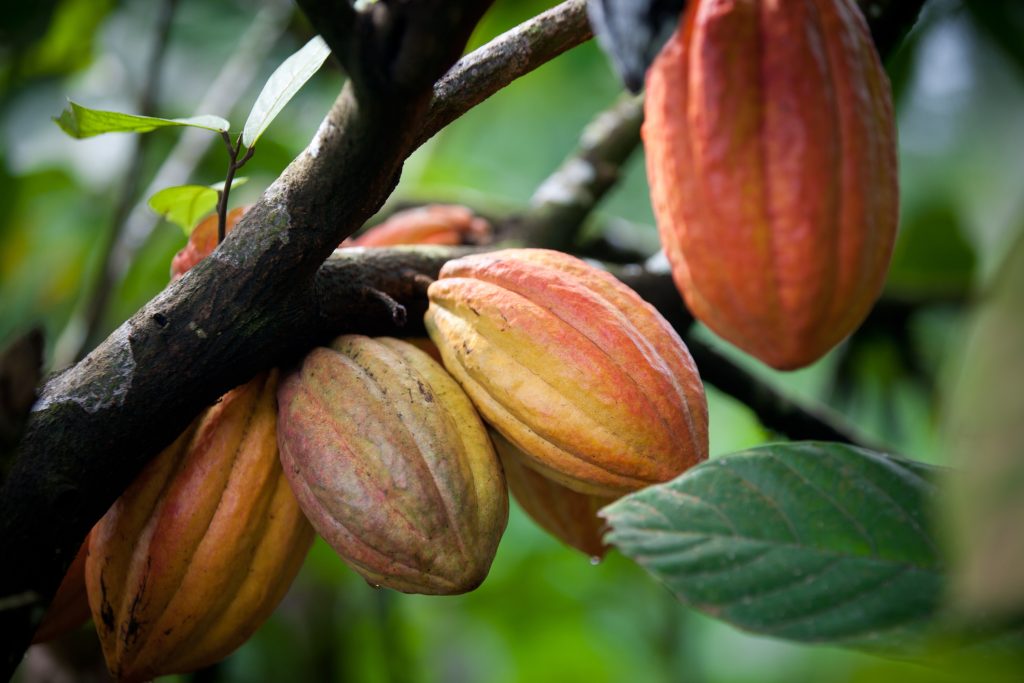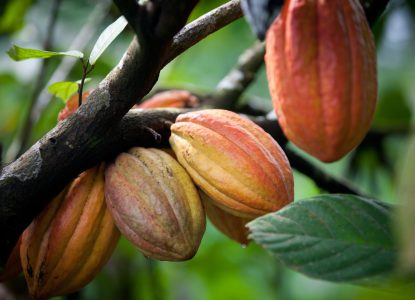By Antonie Fountain, Managing Director of VOICE Network
– – –
Why do Europe and the United States have most of the power in the global commodity trade? Why are all the large cocoa and chocolate companies – and therefore the decision-making power – based in the Global North, far from where the key crop is grown? How come there are no West Africans in senior positions in the cocoa and chocolate industry? Why is it that voices of NGOs from the Global North are more easily heard than those from the producing nations themselves?
These questions are an elephant in the room around sustainability conversations in any tropical commodity. And though the few pages of this blog, clearly, are never going to be enough to do this topic justice, perhaps they might be a starting point for a sector-wide conversation and internal reflection.
The current reality of the global cocoa trade – and the injustices and inequality that it contains – cannot be understood without the context of the past; the history of colonization informs trade structures that have transitioned into our era. The current cash crop driven economies in West Africa are a direct result of both colonial rule as well as by extensive interventions by the IMF and World Bank.
Though Europe and North America send so-called development aid towards the Global South, this is dwarfed by the value extracted from the Global South in cheap labour, agricultural products, and other commodities. The Global North still appropriates the vast majority of the wealth of its former colonies.

Historical injustices resonate in current sensitivities
Straddling the coast of Ghana, halfway between Accra and Côte d’Ivoire, lies Fort Elmina. This historical slaving station is a symbol of the horrific transatlantic slave trade. Generations of West Africans have grown up with the knowledge of this historical injustice.
However, use of the term “slavery” does not just refer to a historical injustice of centuries past, it is still often used in the context of cocoa. Some actors, especially in the Global North, have used the concept ‘modern slavery’ liberally over the past decades. It is not only used to describe cases of forced labour – which remains a real issue in the cocoa sector – but has also often been used as a blanket term for many different labour violations in the cocoa sector.
The intentions of especially civil society and media in the Global North might have been good, but it exhibits a lack of understanding of the deep historic and painful resonance of the word “slavery”.
Stakeholders should critically review their communications and reflect on whether this is always the appropriate terminology to use.
Representation
All too often, the cocoa sustainability conversation is about farmers, without having farmers at the table. It is about African or Latin American interests, without these interests being represented by African or Latin American organisations and governments. This has serious and far-reaching implications. Interventions are generally chosen that are convenient to those in power, not to those who must implement the interventions. Language is used that might further inflame historic injustices, or simply confirm existing power imbalances.
Barriers to representation can vary widely; absence of translation, costs of travel, visa restrictions,[1] or an absence of funding for hours, can already pose a high threshold. Prejudice and discrimination against people of colour abound – both in the Global South as well as against people of colour in the Global North.
The lack of representation at senior level in the chocolate and cocoa sector is stark. Of the sixteen board members of the World Cocoa Foundation, not one is from West Africa. None are black. The Executive Secretary of the Côte d’Ivoire and Ghana Cocoa Initiative – an Ivorian national – was not able to break the glass ceiling after decades within the cocoa industry as director. He was elevated to executive position by a West African initiative, not by western multinationals. Though it is best not to have the illusion of representation, these examples do show where the power lies, and in whose interest this power is exercised.
The fact that farmers and West African governments have been calling for higher prices for many years, but that companies simply are not willing to broach that subject is a good example of this.

A lack of representation can be unintended – part of the problem of privilege is that it is often blind to its own privilege – and to address this, all stakeholders should actively question to what extent this might affect their own operations. Whether or not the lack of representation is intended, the lived reality for those that are not represented is equally harsh.
There is a direct power imbalance between those with money – and therefore decision-making capacity – and the recipients of support. Whether these are company-initiated or run by international organisations or NGOs; in donor-client relationships, southern implementors and communities are unequal partners. Not only is there a financial power imbalance, but in the north-south relationship, generally the risk is also largely borne by the “clients” in the Global South.
The voice of farming communities as well as of producing governments to actively tackle the issue of low commodity prices continuously is counteracted by global industry, for example. Instead, the importance is stressed of agronomic approaches, implying that it’s the (lazy or uninformed) farmers that are to blame for their own poverty. If decisions are made by those in Europe and the United States, those decisions tend to favour those in power.
The division of labour in the production chain has been inherited from the colonial period; the decision-making power lies elsewhere than in West Africa. Implicitly, there is an assumption that the injustice and inequality could be dismantled within the current division of labour. It is an open question whether this would even be possible.
Progress
The past years have seen some major steps of self-organisation and representation in West Africa, both at the level of government and of civil society. The collaboration between the governments of the two largest cocoa producing nations to set up the Côte d’Ivoire and Ghana Cocoa Initiative is a seminal development, where producing nations are working together in using their market power to demand structural reform in the way cocoa is being traded. Recent developments that Cameroon and Nigeria are seeking closer collaboration with this initiative are important steps forward.
At civil society level, both Ghana and Côte d’Ivoire have seen the formation of broad collaboration between civil society and farmer organisations, to ensure they can speak up on behalf of rightsholders in the community. The Ghanaian Civil Society Cocoa Platform (GCCP)[2] and the Plateforme Ivoirienne pour le Cacao Durable[3] both bring together dozens of CSOs and producer organisations, speaking out at both a national and international level.
Dismantling unjust structures
Bridging the vast gap in representation will take a long time – and proactive engagement by everyone. However, change is always a day away if the journey never even gets started delivering on the low-hanging fruits, such as paying higher farm gate prices and inviting farmers to the global cocoa dialogue. There will also be setbacks, and part of the challenge is to not expect perfection from the start. Southern leadership – including farmers, researchers and activists – needs time, space, and resources to build its voice and power. Dealing with the topic of racial injustice will require every actor – industry, government, and civil society alike – to recognise and openly deal with their own role in maintaining or dismantling the globally unjust structures that we currently all operate in.
Summary
The current reality of the global cocoa trade – and the injustices and inequality that it contains – cannot be understood without the context of the past; the history of colonization informs trade structures that have transitioned into our era. Furthermore, representation matters. All too often, the conversation is about farmers, without having farmers at the table. It is about African or Latin American interests, without these interests being represented by African or Latin American organisations and governments.
– –
[1] Visa restrictions are definitely intended barriers; their whole designed purpose is to exclude people from the Global South to move freely and at will. Stakeholders in the cocoa sector would do well to ensure that activities for a global dialogue – if held in person – are held in countries with the least possible travel restrictions for Southern participants.
[2] https://gccp.org.gh/
[3] http://www.plateformecacao.org/
– – –
Antonie Fountain is Managing Director of the VOICE Network and co-author of the Cocoa Barometer. He acts as one of the key spokespersons for civil society in cocoa, and has been actively advocating a sustainable cocoa sector for more than a decade.
Listen to Antonie’s comments in our webinar on neocolonialism in the cacao industry here.


